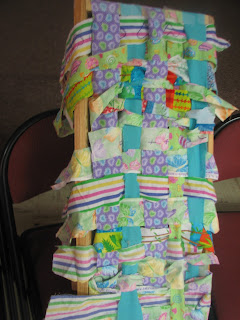Before Christmas, I heard
an episode of
On Being, which featured an interview with Rebecca Solnit. It was aired during the 2016 election campaign, but I didn't catch it then. Solnit talks a lot about hope, and how many of us think about hope in wrong ways or ways that leave us hopeless.
For example, Solnit talks about Walter Brueggemann, and says, "Yeah, and I listened to his interview, and he talked about how much hope is grounded in memory. And I was so excited to hear someone say that. We think of hope as looking forward, but memory lets us know, if we have a real memory, that we didn’t know. We didn’t know the Berlin Wall was going to fall, and the Soviet Union was going to fall apart, and the binary arrangement those of us who are older grew up in, where it seemed like capitalism and communism and the Cold War standoff was going to last for centuries.
If you study history deeply, you realize that, to quote Patti Smith, “People have the power” — that popular power, civil society, has been tremendously powerful and has changed the world again and again and again; that we’re not powerless; that things are very unpredictable and that people have often taken on things that seemed hopeless — freeing the slaves, getting women the vote — and achieved those things. And I feel like so much of what we’re burdened by is bad stories, both people who have amnesia, who don’t remember that the present was constructed by certain forces to serve certain elements and can be deconstructed and that things could be very different, that they have been very different, that things are always changing and that we have agency in that change.
And one of the simple examples I often go back to is that when you and I were small, to be gay or lesbian or otherwise — something other than standard heterosexual — was to be considered mentally ill or criminal or both, and punished accordingly. And to go from there to national same-sex marriage rights is an unimaginable journey. It’s — and that’s a lot of what my hopeful stuff is about, is trying to look at the immeasurable, incalculable, indirect, roundabout way that things matter.
My friend, David Graber, has a wonderful passage about how the Russian revolution succeeded, but not really in Russia. It terrified, or at least motivated, leaders in Europe and North America and elsewhere to make enormous concessions to the rights of poor and workers and really furthered economic justice in other places. And if you can say that a revolution was successful, but not in the country it took place in, then you can start to trace these indirect impacts."
Krista Tippett, the interviewer, sums it up nicely, "You have this wonderful sentence that 'History is like the weather, not like checkers.' And you talk about — here’s another: 'Sometimes cause and effect are centuries apart; sometimes Martin Luther King’s arc of the moral universe that bends towards justice is so long few see its curve; sometimes hope lies not in looking forward but backward to study the line of that arc.' It’s an un-American way of thinking, but it’s an essential way, I think, to inhabit this century, in particular."
Along the way, there's a wonderful conversation about the ways that New Orleans has gotten better after Hurricane Katrina, in ways that might not have happened, had there not been a massive storm.
She keeps reminding us that hope isn't a rosy optimism, an insurance that we can make everything O.K., because we can't. Hope is about negotiating, realizing all the while that we can't possibly guess all the outcomes of our actions.
She offers historical examples: "And my wonderful environmentalist friend, Chip Ward, likes to talk about the 'tyranny of the quantifiable,' and I’ve been using that phrase of his for about 15 years. And it is a kind of tyranny, and I think — and it does get mystical, where you have to look at what’s not quantifiable. Martin Luther King is assassinated in 1968. A comic book about how civil disobedience works out was distributed during the civil rights movement, gets translated into Arabic and distributed in Egypt and becomes one of the immeasurable forces that help feed the Arab Spring, which is five years old right now; and most of it doesn’t look that good, but they did overthrow a bunch of regimes. And the French Revolution didn’t really look very good five years out, I was saying the other day.
She concludes this way, near the end of the interview: "And hope is tough. It’s tougher to be uncertain than certain. It’s tougher to take chances than to be safe. And so hope is often seen as weakness, because it’s vulnerable, but it takes strength to enter into that vulnerability of being open to the possibilities. And I’m interested in what gives people that strength, and what stories, what questions, what memories, what conversations, what senses of themselves and the world around them.







































